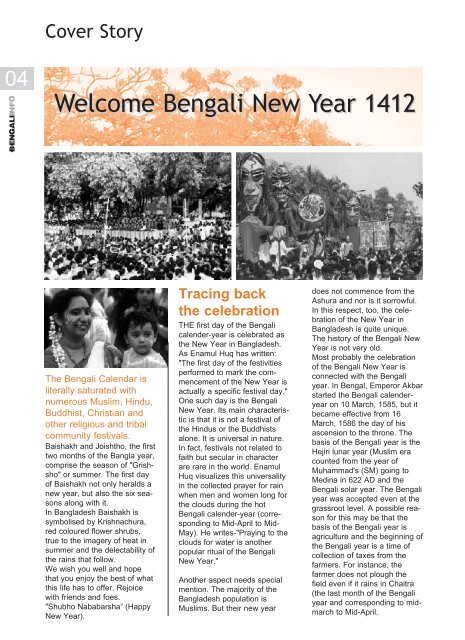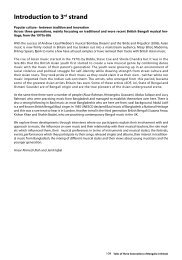Welcome Bengali New Year 1412
Welcome Bengali New Year 1412
Welcome Bengali New Year 1412
Create successful ePaper yourself
Turn your PDF publications into a flip-book with our unique Google optimized e-Paper software.
04<br />
Cover Story<br />
<strong>Welcome</strong> elcome <strong>Bengali</strong> <strong>New</strong> <strong>Year</strong> <strong>Year</strong><br />
<strong>1412</strong><br />
The <strong>Bengali</strong> Calendar is<br />
literally saturated with<br />
numerous Muslim, Hindu,<br />
Buddhist, Christian and<br />
other religious and tribal<br />
community festivals.<br />
Baishakh and Joishtho, the first<br />
two months of the Bangla year,<br />
comprise the season of "Grishsho"<br />
or summer. The first day<br />
of Baishakh not only heralds a<br />
new year, but also the six seasons<br />
along with it.<br />
In Bangladesh Baishakh is<br />
symbolised by Krishnachura,<br />
red coloured flower shrubs,<br />
true to the imagery of heat in<br />
summer and the delectability of<br />
the rains that follow.<br />
We wish you well and hope<br />
that you enjoy the best of what<br />
this life has to offer. Rejoice<br />
with friends and foes.<br />
"Shubho Nababarsha” (Happy<br />
<strong>New</strong> <strong>Year</strong>).<br />
Tracing back<br />
the celebration<br />
THE first day of the <strong>Bengali</strong><br />
calender-year is celebrated as<br />
the <strong>New</strong> <strong>Year</strong> in Bangladesh.<br />
As Enamul Huq has written:<br />
"The first day of the festivities<br />
performed to mark the commencement<br />
of the <strong>New</strong> <strong>Year</strong> is<br />
actually a specific festival day."<br />
One such day is the <strong>Bengali</strong><br />
<strong>New</strong> <strong>Year</strong>. Its main characteristic<br />
is that it is not a festival of<br />
the Hindus or the Buddhists<br />
alone. It is universal in nature.<br />
In fact, festivals not related to<br />
faith but secular in character<br />
are rare in the world. Enamul<br />
Huq visualizes this universality<br />
in the collected prayer for rain<br />
when men and women long for<br />
the clouds during the hot<br />
<strong>Bengali</strong> calender-year (corresponding<br />
to Mid-April to Mid-<br />
May). He writes-"Praying to the<br />
clouds for water is another<br />
popular ritual of the <strong>Bengali</strong><br />
<strong>New</strong> <strong>Year</strong>."<br />
Another aspect needs special<br />
mention. The majority of the<br />
Bangladesh population is<br />
Muslims. But their new year<br />
does not commence from the<br />
Ashura and nor is it sorrowful.<br />
In this respect, too, the celebration<br />
of the <strong>New</strong> <strong>Year</strong> in<br />
Bangladesh is quite unique.<br />
The history of the <strong>Bengali</strong> <strong>New</strong><br />
<strong>Year</strong> is not very old.<br />
Most probably the celebration<br />
of the <strong>Bengali</strong> <strong>New</strong> <strong>Year</strong> is<br />
connected with the <strong>Bengali</strong><br />
year. In Bengal, Emperor Akbar<br />
started the <strong>Bengali</strong> calenderyear<br />
on 10 March, 1585, but it<br />
became effective from 16<br />
March, 1586 the day of his<br />
ascension to the throne. The<br />
basis of the <strong>Bengali</strong> year is the<br />
Hejiri lunar year (Muslim era<br />
counted from the year of<br />
Muhammad's (SM) going to<br />
Medina in 622 AD and the<br />
<strong>Bengali</strong> solar year. The <strong>Bengali</strong><br />
year was accepted even at the<br />
grassroot level. A possible reason<br />
for this may be that the<br />
basis of the <strong>Bengali</strong> year is<br />
agriculture and the beginning of<br />
the <strong>Bengali</strong> year is a time of<br />
collection of taxes from the<br />
farmers. For instance, the<br />
farmer does not plough the<br />
field even if it rains in Chaitra<br />
(the last month of the <strong>Bengali</strong><br />
year and corresponding to midmarch<br />
to Mid-April.
The fields are generally<br />
ploughed in the month of<br />
Baisakh (April-May) and the<br />
prayer for the rains is also<br />
because of this.<br />
However, the common man still<br />
refers to the <strong>Bengali</strong> calender<br />
of his day to day activiites and<br />
the city-dwellers to the Juliun<br />
calender. In this context,<br />
Shamsuzzaman Khan has<br />
rightly remarked that Akbar had<br />
once started the pan-Indian<br />
Islamic year as well as the<br />
<strong>Bengali</strong> year.<br />
"The introduction of <strong>Bengali</strong><br />
year had not only survived but<br />
at one time had also given the<br />
unique power of nationalistic<br />
feelings and pride to the separated<br />
and divided mainly joint<br />
<strong>Bengali</strong> socity."<br />
The <strong>New</strong> <strong>Year</strong> begins in different<br />
seasons in different countries<br />
of the world. The <strong>Bengali</strong><br />
<strong>New</strong> <strong>Year</strong> is in summer.<br />
Summer is not a pleasant time<br />
in Bangladesh. Festivals and<br />
merriments are not as much<br />
possible in summer as during<br />
the beginning of winter or<br />
spring. Many people believe<br />
that the <strong>Bengali</strong> <strong>New</strong> <strong>Year</strong><br />
should have begun in the<br />
month of Agrahayan (the<br />
eighth month of the <strong>Bengali</strong><br />
year and corresponds to Mid-<br />
November to Mid-December)<br />
even considering from the point<br />
of agriculture as Agrahayan is,<br />
for instance, the month of reaping.<br />
Yet <strong>New</strong> <strong>Year</strong> is celebrated<br />
in Baisakh. Pallab Sengupta<br />
writes: "The <strong>New</strong> <strong>Year</strong> is calculated<br />
either from Hemanta or<br />
late autumn (between autumn<br />
and winter) or spring, that is<br />
from the time when new crops,<br />
flowers and fruits start growing.<br />
This, at least, was the custom<br />
initially. Later, with the passage<br />
of time, it shifted to other seasons<br />
due to practical necessities.<br />
The custom of beginning<br />
the year from January 1 or<br />
Baisakh 1 is thus quite foolish."<br />
But that mystery has not been<br />
unravelled. As Bangladesh is<br />
located in the tropics the importance<br />
of summer in this region<br />
is natural. Moreover, the drying<br />
up of the canals, rivers and<br />
streams at that time and the<br />
acute crisis for water makes<br />
the tremendous changes in<br />
season easily felt. And then<br />
comes the Nor'westers like wild<br />
buffaloes throwing everything<br />
in complete disorder. The rains<br />
start immediately lowering the<br />
temperature and making the<br />
Cover Story<br />
conditions favourable for<br />
ploughing.<br />
In any country the principal festival<br />
has been organised with<br />
respect to the particular season<br />
which has gained importance<br />
there. Moreover, the minor<br />
seasonal festivals are also regularly<br />
held. Bengal has a<br />
unique position in this regard. It<br />
is clear that its main seasonal<br />
festival was in summer. Just as<br />
elsewhere in the world, the<br />
main seasonal festival has<br />
been considered as the <strong>New</strong><br />
<strong>Year</strong> festival, the main summer<br />
festival of our country is likewise<br />
considered as the <strong>New</strong><br />
<strong>Year</strong> festival. One feels that the<br />
devastating form of nature and<br />
the consequent creativity of<br />
nature that one witnesses in<br />
Bangladesh, must have made<br />
summer and the summer festivals<br />
so important in our ancient<br />
culture. Otherwise the <strong>New</strong><br />
<strong>Year</strong> celebration and festival of<br />
Bangladesh would have been<br />
greatly influenced by religion.<br />
Our country is largely inhabited<br />
by the Hindus, Buddhists,<br />
Muslims and Christians but "no<br />
particular influence of these<br />
religions are observed in our<br />
<strong>New</strong> <strong>Year</strong> celebrations and festival."<br />
05
06<br />
Cover Story<br />
During the last four hundred<br />
years, that is after the introduction<br />
of the <strong>Bengali</strong> <strong>Year</strong> by<br />
Akbar, many festivals connected<br />
probably with agriculture<br />
and seasons have become<br />
associated with it. And the first<br />
of Baisakh gradully changed in<br />
this way to become the <strong>New</strong><br />
<strong>Year</strong>. To the special features of<br />
the <strong>Bengali</strong> <strong>New</strong> <strong>Year</strong> that<br />
Enamul Huq has mentioned,<br />
we can add here that the<br />
<strong>Bengali</strong> <strong>New</strong> <strong>Year</strong> saw the<br />
addition of a new political<br />
dimension from the 60's of the<br />
present century. No season in<br />
any other country has such a<br />
political aspect.<br />
In Bangladesh many secondary<br />
matters are linked with the<br />
<strong>New</strong> <strong>Year</strong>. Some of those have<br />
become obsolete while some<br />
still exist in certain special<br />
regions only.<br />
However, the practice of opening<br />
fresh account-book is still in<br />
practice specially among the<br />
business class. On <strong>New</strong> <strong>Year</strong>'s<br />
day the businessmen complete<br />
the accounts of the past year.<br />
For this purpose many use a<br />
special type of ledger book<br />
bound in red-cloth called the<br />
Khero Khata. The customers<br />
are greeted with sweets<br />
(Mishti) on that day. Also,<br />
many urbanites of Dhaka buy<br />
sweets and have good food on<br />
the occasion of the <strong>New</strong> <strong>Year</strong>.<br />
The most important function of<br />
Baisakh and the first day of<br />
Baisakh is the fair (Mela). The<br />
<strong>New</strong> <strong>Year</strong> fairs of our country<br />
are also nothing but the<br />
changed forms of the oldest<br />
'seasonal festivals' and 'agricultural<br />
festivals' of Bangladesh.<br />
This is because local agricultural<br />
products and handicrafts<br />
are sold in these fairs even<br />
today. According to a survey,<br />
about two hundred fairs are<br />
organised throughout<br />
Bangladesh on the first day<br />
and the first week of Baisakh.<br />
It has already been mentioned<br />
before that in Bangladesh celebration<br />
of the first day of<br />
Baisakh began as a part of the<br />
cultural movement and it<br />
added a new dimension to the<br />
political movements. During the<br />
regime of Ayub Khan in the<br />
late sixties, when attack was<br />
made against Rabindra<br />
Sangeet (Tagore Song) and<br />
the <strong>Bengali</strong> culture, the<br />
Chhayanat group organised a<br />
programme of<br />
Rabindrasangeet on the first of<br />
Baisakh under the banyan tree<br />
at Ramna to celebrate the <strong>New</strong><br />
<strong>Year</strong>. It was a protest against<br />
religious fundamentalism. This<br />
endeavour by Chhayanat gradually<br />
became popular and in<br />
the perspective of the freedom<br />
movement the <strong>Bengali</strong> <strong>New</strong><br />
<strong>Year</strong> was celebrated in a grand<br />
way as a protest against the<br />
ideology of the ruling class.<br />
After the independence of<br />
Bangladesh, the <strong>Bengali</strong> <strong>New</strong><br />
<strong>Year</strong> was declared as a public<br />
holiday. Thus with the celebration<br />
of the <strong>New</strong> <strong>Year</strong> at the<br />
grass-root level was added the<br />
endeavour of the urban people.<br />
We may conclude that the only<br />
secular festival of Bangladesh,<br />
in every sense of the term, is<br />
the <strong>Bengali</strong> <strong>New</strong> <strong>Year</strong>. Its speciality<br />
lies in the fact that in<br />
spite of being the festival of a<br />
country where the majority are<br />
Muslims, it is not melancholic.<br />
Although the state has been<br />
successful in the other areas it<br />
has failed to incorporate the<br />
religious factor in this case.<br />
Moreover, the <strong>New</strong> <strong>Year</strong> still<br />
adds a new dimension to the<br />
movements against tyranny.<br />
Considering all these aspects<br />
we can refer to the <strong>Bengali</strong><br />
<strong>New</strong> <strong>Year</strong> as a festival of the<br />
world which has rare characteristic.<br />
Daily Star .net 2004



